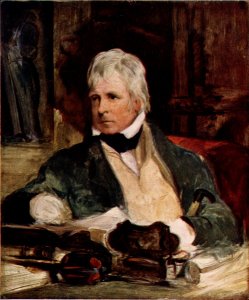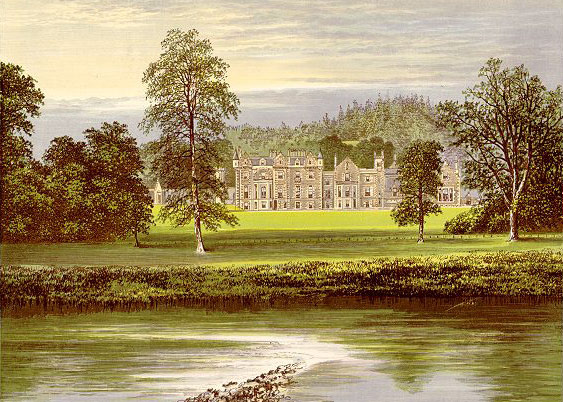
Sir Walter Scott wrote in his journal on March 14, 1826:
I have amused myself occasionally very pleasantly during the last few days, by reading over Lady Morgan’s novel of _O’Donnel_,[221] which has some striking and beautiful passages of situation and description, and in the comic part is very rich and entertaining. I do not remember being so much pleased with it at first. There is a want of story, always fatal to a book the first reading–and it is well if it gets a chance of a second. Alas! poor novel! Also read again, and for the third time at least, Miss Austen’s very finely written novel of _Pride and Prejudice_. That young lady had a talent for describing the involvements and feelings and characters of ordinary life, which is to me the most wonderful I ever met with. The Big Bow-wow strain I can do myself like any now going; but the exquisite touch, which renders ordinary commonplace things and characters interesting, from the truth of the description and the sentiment, is denied to me. What a pity such a gifted creature died so early![222]
Scott’s journal entry for September 18, 1827, has the following reference to Austen:
September 18.–Wrote five pages of the _Tales_. Walked from Huntly Burn, having gone in the carriage. Smoked my cigar with Lockhart after dinner, and then whiled away the evening over one of Miss Austen’s novels. There is a truth of painting in her writings which always delights me. They do not, it is true, get above the middle classes of society, but there she is inimitable.
And this is Austen’s famous comment on Scott:
Walter Scott has no business to write novels, especially good ones. – It is not fair. – He has Fame & Profit enough as a Poet, and should not be taking the bread out of other people’s mouths. – I do not like him, & do not mean to like Waverley if I can help it – but fear I must…
[ Letter 108, 28 September 1814, to Anna Austen (Le Faye)]
Further reading on Scott:
- The Journal of Sir Walter Scott- read online at Readbookonline.net
- The Journal of Sir Walter Scott at Project Gutenberg
- Walter Scott Digital Archive at Edinburgh University Library, with many links to works, images, bibliographies, etc.
- Walter Scott at the Victorian Web
- Abbotsford – Scott’s home in Scotland

Abbotsford
- Millgate, Jane. “Persuasion and the Presence of Scott,” Persuasions 15, 1993
- Sabor, Peter. “Finished up to Nature” : Walter Scott’s Review of Emma, ” Persuasions 13, 1991
- text of Scott’s review of Emma in the Quarterly Review (1816) at The Literary Encyclopedia
[Portrait image from University of Michigan website]

Pingback: Men Reading Jane Austen « Jane Austen’s World
I find it amusing that Scott liked Austen, but Austen did not like Scott. Isn’t that how life normally rotates…. ;)
LikeLike
I do not think that Austen did not like Scott – on the contrary, I was viewing the above quote as typical of her tongue-in-cheek commentary – I think she did like Scott’s novels in spite of not wanting to – she goes on to say in this quote to mention dislikes of other writers: “I am quite determined however not to be pleased with Mrs. West’s [i.e. Jane West] Alicia de Lacy” and then “I have made up my mind to like no Novels really, but Miss Edgeworth’s, Yours & my own.-” this is all ironic… Austen later is critical of Scott’s review of her Emma, as he does not mention Mansfield Park at all [letter 139 to John Murray, her publisher] – but I do think that she admired and liked his work… I will look into this further – do you know of anything else that clarifies her like/dislike?
Thanks for visiting!
LikeLike
I believe that the first reviews, during Jane Austen’s lifetime, will show a better understanding of the extensive ‘skin-colour’ schematics Austen offers. ‘Mr. Elton, spruce, black and smiling’ or Mr. Crawford: ‘absolutely plain, black and plain.’
WAS JANE AUSTEN (1775-1817) BLACK?
By Egmond Codfried
The glory of nations is chiefly derived from their writers wrote Dr. Samuel Johnson (1708-1784). And many around the world deeply enjoy Jane Austen’s books and letters, of which the interpretation is constantly fine-tuned and made into movies and TV series. They study human behaviour and are satirical of human failings. Her style was based on Dr. Samuel Johnson’s: ‘cool, well-ordered, witty and incisive observations of life.’ But because Austen’s live straddled the decisive period around the French Revolution (1789-1795), her life, her books and surviving letters can also be mined for her ideas about the radical changing times. Although she wrote novels in the Romantic fashion: ‘The passion of Romantism did not inspire her.’ So I, because of my research interests, look for Austen’s ideas about the changing views on the emergence and the controversial role of Race. In this light, the fact that there is no credible portrait of Britain’s finest nineteen-century female writer should be considered as highly problematic. Jane Austen, properly read, might grow into our greatest activist in proclaiming the glory of Blacks……
http://www.egyptsearch.com/forums/ultimatebb.cgi?ubb=get_topic;f=15;t=003159
LikeLike
Hello Mr. Codfried, my apologies for the delay in “approving” your comment – it got lost in vacations, company, and work! I see your full article can be found here:
http://www.africaresource.com/rasta/sesostris-the-great-the-egyptian-hercules/was-jane-austen-1775-1817-black-by-egmond-codfried/
All very interesting, so thank you for posting this here! – I will read this through and reply again.
Deb
LikeLike
You answered me more then a year ago. Now I have moved on to Charlotte Brontë and lo and behold: all this blackness tumbling from her pages. Vilette is a brunette of complexion, just like our Jane Austen was. Angria is located in West Afrika, and the hero Zamorna has a Ashanti foster brother, an African prince. And so on…
LikeLike
Pingback: Jane Austen and the Literary Foremothers, Part V: A subversive tradition – Jane Austen History – Literary Detectives | The Literary Detectives
http://books.google.nl/books/about/Was_Jane_Austen_Black.html?id=nU4sMwEACAAJ&redir_esc=y
My research, will make a second edition soon. The Blumenbach definition of Blacks as Black Caucasian is confusing. There are no Black Caucasians. They identified as Europeans, yes, and saw whites as shoe leather till 1848.
The biggest problem now is the fraUD WITH OVER PAINTED PORTRAITS IN ALL MUSEUMS SINCE 1848.
LikeLike
https://www.facebook.com/#!/pages/A-New-Jane-Austen-For-The-21-Century/213748398833974?fref=ts
My FB Jane Austen page.
LikeLike
Pingback: No More Excuses: Jane Austen's Writing Table
Pingback: September 28 1814: Jane Austen and Walter Scott | pastnow
To Mr. Cod-Oil: This page concerns Jane Austen and Walter Scott, not your half-baked “research,” and most certainly not your shameful self-advertisement. If you are so much in need of attention, kindly go elsewhere to obtain it. Your twenty-first century intrusion is most un-welcome, and lowers my IQ just by having to encounter it when reading about those who will ever be much greater than yourself, and that by their intrinsic merit, something which you and your “look at me” will never quite understand.
LikeLike
Well, I’m not sure that this isn’t spam, but it made me laugh out-loud, so therefore I shall approve it… so very sorry to intrude upon your 18th century sensibilities!
LikeLike
‘Twas “Egmond Codfried” who intruded upon your page and lowered its notable aim, dare I say. Thank you for posting my objection. I appreciate your fairness.
LikeLike